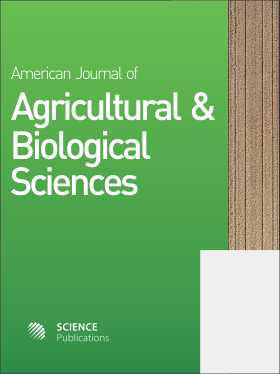A Simulation Model Estimates of the Intercropping Advantage of an Immature-Rubber, Banana and Pineapple System
- 1 School of Sustainable Agriculture, University Malaysia Sabah, Locked Bag 2073, 88999 Kota Kinabalu, Sabah, Malaysia
- 2 Department of Plant Science and Environmental Ecology, Faculty of Resource Science and Technology, University Malaysia Sarawak, 94300 Kota Samarahan, Sarawak, Malaysia
- 3 Departments of Land Management, University Putra Malaysia, 43400 Serdang, Selangor, Malaysia
- 4 Crop Science Faculty of Agriculture, University Putra Malaysia, 43400 Serdang, Selangor, Malaysia
- 5 Department of Crop Science, Faculty of Agriculture and Food Science, University Putra Malaysia Bintulu Campus, Sarawak, 97008 Bintulu, Sarawak, Malaysia
Abstract
Problem statement: Intercropping has been shown to have many advantages but it is fallacious to conclude it is always a better cropping system. Little is known about a new double-hedgerow intercropping of rubber, banana and pineapple in relation to its effects on growth and yield of the component crops when compared to their monocrops. Simulation modeling offers a cheaper and faster alternative to explore cropping scenarios and estimate their productivity under a wide range of management and environmental conditions. This simulation study was therefore undertaken to evaluate the growth and yield of immature rubber, banana and pineapple intercrop and monocrop scenarios with the aid of an intercrop simulation model named SURHIS, as well as estimating the intercropping advantage. Approach: A FORTRAN computer model (SURHIS) that simulated the daily light interception and utilization by immature-rubber, banana and pineapple intercropping system was used to simulate intercrop and monocrop scenarios to estimate potential Dry Matter Yield (DMY) for all crops as well as fruit yields for banana and pineapple. The results of the model were tested for accuracy by comparing actual field experimental results with the aid of Mean Deviation (MD) and Mean Absolute Error (MAE) statistical analyses. Intercropping advantage was assessed using the Land Equivalent Ratio (LER) analysis. Results: The model was representative or predicted DMY of the crops with sufficient accuracy. The LER analysis showed that the intercropping system had a dry matter yield productivity advantage of 81% more than monocrops of the component crops. The results also showed that the higher the Plant Population Density (PPD), the greater is the dry matter yield. It was also shown that banana and pineapple had no deleterious effect on the growth of rubber. Fruit weight per plant of banana and pineapple was reduced with increase in PPD for the monocrops. Measured average fresh fruit bunch weight for banana was 18 kg plant-1 and the average fresh fruit weight per plant for pineapple was 2.1 kg for the intercropping system. Conclusion: Intercropping of banana and pineapple with immature-rubber is more productive than the component crops grown as monocrops in their respective optimum plant population densities per hectare. The model can be useful for predicting potential productivity, with sufficient accuracy, of the afore-mentioned intercropping system under varying plant density and environment scenarios as well as acting as a guide for plant density experimentation.
DOI: https://doi.org/10.3844/ajabssp.2009.249.254

- 7,528 Views
- 6,549 Downloads
- 10 Citations
Download
Keywords
- Intercropping advantage
- rubber
- Banana
- pineapple
- simulation model
- SURHIS
